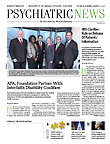Antidepressant Shows Efficacy in Alzheimer’s, but Cardiac Side Effects a Concern
While citalopram has been used to reduce agitation and aggression in individuals with Alzheimer’s disease (AD), a recent study suggests that use of the drug in these patients may be increasing their health risks.
Researchers from Johns Hopkins Bayview Medical Center and the University of Rochester Medical Center randomized 186 nondepressed patients with AD to received nine weeks of psychosocial therapy plus either citalopram or placebo to evaluate the efficacy of 30mg per day of citalopram for AD-associated agitation—which affects 90 percent of patients with AD, according to the study.
Results showed that 40 percent of the patients receiving citalopram had improvements in agitation from baseline, compared with 26 percent of placebo recipients. However, the patients taking citalopram had longer QT intervals—a measure of abnormal heart functions—than did the placebo group.
Constantine Lyketsos, M.D., M.H.S, coauthor and director of psychiatry at Johns Hopkins Bayview, commented in a statement that he and his colleagues plan to investigate the effectiveness of lower doses of citalopram in treating AD-related agitation, a strategy that may pose less cardiovascular risk. In the meantime, Lyketsos said, the drug offers an alternative to treating agitation in individuals with AD who may be nonresponsive to nonmedication treatments.
An abstract of “Dynamic Modeling of Patient and Physician Eye Gaze to Understand the Effects of Electronic Health Records on Doctor-Patient Communication and Attention” can be accessed
here.
Infants Who Disengage From Speaking Faces May Have Increased Autism Risk
A study conducted by researchers at Yale University School of Medicine and the University of Texas Southwestern Medical Center suggests that infants who divert their gaze from a speaking face may be at increased risk for being diagnosed with autism spectrum disorder (ASD) later in childhood. The researchers used an eye-tracking technology to analyze the gaze of 100 six-month- old infants who looked at videos of still, smiling, and speaking faces. Three years later, the infants were divided into groups based on typical development, developmental delays, or a diagnosis of ASD.
The analysis showed that infants who later developed ASD not only looked at faces less than other infants, but also looked away from key facial features such as eyes and mouth when being shown a face that was speaking. According to the researchers, this is the first study to isolate an atypical response to speech as a specific characteristic in the first half year after birth that is associated with later emergence of ASD.
The authors concluded that though ASD is not typically diagnosed until at least age 2, their findings confirm previous research showing that abnormalities in behavior and attention can be detected as early as six months after birth.
Shic F, Macari S, and Chawarska K. “Speech Disturbs Face Scanning in 6-Month-Old Infants Who Develop Autism Spectrum Disorder.” Feb 2014. Biol Psychiatry. 75(3):231-7 is available
here.
Illicit Drug Users More Likely to Contemplate Suicide Than General Population
The Substance Abuse and Mental Health Services Administration (SAMHSA) reported that adults using illicit drugs are significantly more likely to contemplate suicide than the general adult population. The report is based on the findings from SAMHSA’s 2012 National Survey on Drug Use and Health, which included interviews of approximately 70,000 noninstitutionalized individuals aged 12 or older.
Based on survey responses, SAMHSA estimated that in a given year, 3.9 percent of U.S. adults—9.0 million—have serious thoughts of suicide, but this increased to 9.4 percent among adults who used illicit drugs. In addition, risk for suicidal ideation among people using illicit substances varied by type of drug used. Adults using sedatives for nonmedical purposes were at greatest risk for suicidal thoughts at approximately 21 percent, followed by those using opioid pain relievers at 13 percent, and marijuana at 10 percent.
“Suicide takes a devastating toll on individuals, families, and communities across our nation,” said Peter Delany, Ph.D., director of SAMHSA’s Center for Behavioral Health Statistics and Quality, in a statement. He said that to prevent unnecessary deaths, it is crucial to reach out to all segments of the community to provide support and treatment to those who are at greatest risk for suicidal ideation. ■
The Substance Abuse and Mental Health Services Administration. “1 in 11 Past Year Illicit Drug Users Had Serious Thoughts of Suicide.” 2014. The NSDUH Report. Jan 16 is available
here.
